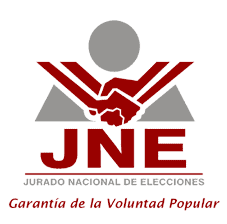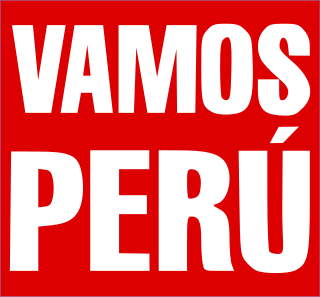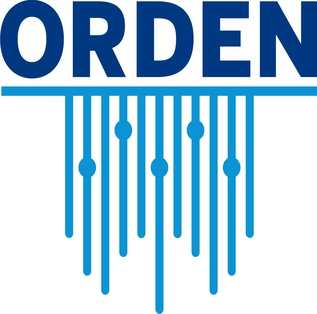
The National Electoral Council is one of the five branches of government of the Bolivarian Republic of Venezuela that was designed to be independent. It is the institution that has the responsibility of overseeing and guaranteeing the transparency of all elections and referendums in Venezuela at the local, regional, and national levels. The creation of the CNE was ratified in Venezuela's 1999 constitutional referendum. Following the election of Nicolás Maduro – Hugo Chávez's handpicked successor – into the presidency, the CNE has been described as being pro-Maduro.
The Broad Front for Justice, Life and Liberty, or simply Broad Front, is a major political coalition of parties, political organizations, social movements and activist citizens of Peru whose main objective is to consolidate the different leftist, progressive, socialist and communist sectors.

The Political Constitution of Peru is the supreme law of Peru. The current constitution, enacted on 31 December 1993, is Peru's fifth in the 20th century and replaced the 1979 Constitution. The Constitution was drafted by the Democratic Constituent Congress that was convened by President Alberto Fujimori during the Peruvian Constitutional Crisis of 1992 that followed his 1992 dissolution of Congress, was promulgated on 29 December 1993. A Democratic Constitutional Congress (CCD) was elected in 1992, and the final text was approved in a 1993 referendum. The Constitution was primarily created by Fujimori and supporters without the participation of any opposing entities.

General elections were held in Peru on 9 April 2000, with a run-off of the presidential election on 28 May. The elections were highly controversial and widely considered to have been fraudulent. Incumbent President Alberto Fujimori was re-elected for a third term with almost three-quarters of the vote. However, the elections were tainted with allegations of unconstitutionality, bribery, structural bias, and outright electoral fraud. Alejandro Toledo boycotted the second round of the presidential election, in which over 30% of ballots were declared invalid. Fujimori subsequently called for new elections after his scandal, fled Peru, and faxed in his resignation from a hotel in Japan.

The National Jury of Elections of is an autonomous constitutional organ, headquartered in Lima, which serves as Peru's electoral court. Its goal is to oversee the legality of electoral processes, guaranteeing the respect for the population's will. Thus, it is the entity in charge of proclaiming the official electoral results and awarding recognitions or credentials to the elected authorities. Furthermore, it passes resolutions to regulate the electoral dispositions.

The National Office of Electoral Processes is the body in charge of organizing elections in Peru. Created in 1993, during the government of Alberto Fujimori, it is headquartered in the Lima District in Lima. Its current National Chief is Manuel Cox Ganoza.

The National Registry of Identification and Civil Status is an autonomous constitutional body of the State of Peru. Its role is to maintain the records of births, marriages, divorces and deaths in the country, as well as of the suffrage eligibility and registration. Its headquarters are in downtown Lima.

Alliance for Progress is a Peruvian political party founded on December 8, 2001 in Trujillo by Cesar Acuña Peralta.

Luis Fernando Galarreta Velarde is a Peruvian Fujimorist politician and a former Congressman representing Lima between 2006 and 2020. He was President of the Congress for the 2017–2018 annual term. Galarreta was part of the presidential ticket of Keiko Fujimori in the 2021 elections that lost the elections to the Pedro Castillo ticket, however, he was elected to the Andean Parliament.

Bolivia has had seventeen constitutions, including the present one, since its foundation in 1825.
The Hope Front was a Peruvian political party. Founded in December 2015 by former congressman and government minister Fernando Olivera, he was nominated for the Presidency in the 2016 general election.

The Purple Party is a centrist, liberal and progressive Peruvian political party. The color purple was chosen to represent the blending of red and blue, the colors of left and right-wing parties in Peru, symbolizing the centrist ideology of the party.

Together for Peru is a Peruvian centre-left to left-wing political coalition founded with the incumbent registration of the Peruvian Humanist Party.

Direct Democracy is a Peruvian political party. Founded in 2001 as Fonavistas of Peru, the party is based on the principles and objectives proposed by the National Association of Fonavistas of the Peoples of Peru (ANFPP). The current political platform was founded by a group of ANFPP affiliates, led by Andrés Alcántara Paredes in 2013.

Let's Go Peru was a centre-left and social democratic Peruvian political party. Headquartered in Lima, the party mainly operated in the Callao.

Peru Action (previously Peru Nation is a minor centre-right Peruvian political party.

Peru Progressing was a minor Peruvian political party. Founded in December 2015 by businessman Manuel Ponce Ayala, the party launched Miguel Hilario, an academic of Shipibo-Konibo descent, as its presidential nominee.

Order Political Party was a minor conservative Peruvian political party. Founded in July 2014 by former Defense Minister, Ántero Flores Aráoz, he was nominated for the Presidency in the 2016 general election.
Women's suffrage in Chile was introduced on the communal level in 1935, and on national level on 8 January 1949. It was the product of a long period of activism, tracing back to 1877, when women were allowed to attend university, a reform which stimulated the formation of a women's movement. The women's suffrage was a reform which was actively promoted since the 1920s by the organizations Consejo Nacional de Mujeres de Chile Comité Nacional pro Derechos de la Mujer, Pro-Emancipation Movement of Chilean Women and Federación Chilena de Instituciones Femeninas (FECHIF).
Carolina Lizárraga Houghton is a Peruvian lawyer, jurist, and politician who serves as a member of the Congress of the Republic of Peru (PM), representing the Lima constituency.
















